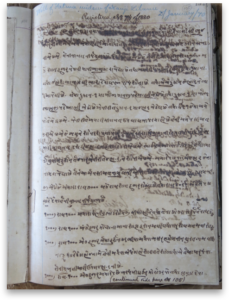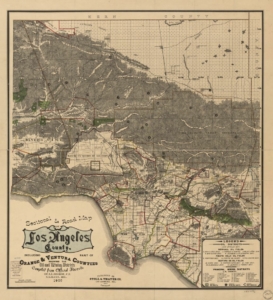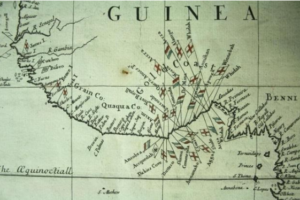Afro-Asian Archives: Preserving and Digitizing South Asian-language Sources for Indian Ocean African History
By: Professor Hollian Wint
T he Zanzibar National Archives (ZNA) is home to a vast collection of Gujarati contracts, wills, letters, and account books that has yet to be sufficiently catalogued, translated, or analyzed and is increasingly endangered by climate and ink corrosion. These documents offer a unique perspective on the social exchanges that constituted the modern western Indian Ocean world. The project’s goals are twofold: firstly, in collaboration with the ZNA, to catalogue, preserve, and digitize this collection; secondly, to promote knowledge about and access to these and other neglected South-Asian language sources for African history through an online database and informational website.
he Zanzibar National Archives (ZNA) is home to a vast collection of Gujarati contracts, wills, letters, and account books that has yet to be sufficiently catalogued, translated, or analyzed and is increasingly endangered by climate and ink corrosion. These documents offer a unique perspective on the social exchanges that constituted the modern western Indian Ocean world. The project’s goals are twofold: firstly, in collaboration with the ZNA, to catalogue, preserve, and digitize this collection; secondly, to promote knowledge about and access to these and other neglected South-Asian language sources for African history through an online database and informational website.
In Search of LA
By: Professor Tawny Paul
 In Search of LA is a digital hub for documenting histories and telling stories about Los Angeles neighborhoods, past and present. It identifies and brings together resources from across the city, including local, community-based collections, digital archives, and institutional repositories, facilitating place-based research. In Search of LA enables collaborative history-making and demystifies the research process. It serves multiple audiences and supports community-based learning at UCLA, scholarly research, and public participation in the creation of historical narratives.
In Search of LA is a digital hub for documenting histories and telling stories about Los Angeles neighborhoods, past and present. It identifies and brings together resources from across the city, including local, community-based collections, digital archives, and institutional repositories, facilitating place-based research. In Search of LA enables collaborative history-making and demystifies the research process. It serves multiple audiences and supports community-based learning at UCLA, scholarly research, and public participation in the creation of historical narratives.
The project will have three prongs:
- Information. A directory that helps users understand the landscape of where resources about neighborhoods might be.
- Information literacy. Guidance on how to locate, interpret and make use of sources. A space to understand and critique how collections are made and preserved.
- Interpretation. Neighborhood histories curated by a variety of users, including students, community members and academic scholars.
In Search of LA is a collaborative project with Katherine Kapsidelis (UCLA Library) and Douglas Barrera (UCLA Center for Community Engagement). We are supported by the UCLA Digital Humanities Research Accelerator Program.
Imagining Futures through Un/Archived Pasts
By: Professor Tawny Paul
PHI is proud to be part of the core team of researchers on this large international project. Led by the University of Exeter, Imagining Futures includes research labs in Tanzania, Lebanon, South Africa, Ghana, Syria, and the UK.
Imagining Futures is founded on the idea that archives are negotiations about visions of the future – whose story will continue to be told and how, and whose silenced – these become acute in moments of post-conflict, displacement and reconstruction.
Our premise is that archives are sites of negotiation about visions of the future. Decisions of what is to be collected, accessed or preserved tend to privilege certain narratives over others. It is about whose story will continue to be told and how, and whose silenced, and these questions are acute in moments of post-conflict, displacement and reconstruction. Acts of archiving that draw on local knowledges and joint decision-making in what is to be remembered or forgotten, have a unique authority. They counter, stereotypes, gentrification, discrimination, and the lack of appreciation for shared histories and of community’s place in the global context.
Please read more about the project here.
Waterfront: A post-Ottoman post-socialist story (2018), a documentary film
Directed by: Prof. Miloš Jovanović
Since 2015, the UAE firm “Eagle Hills” and the Serbian government have collaborated on a 2-billion euro project to revitalize the Savamala, a dilapidated post-industrial neighborhood surrounding Belgrade’s old port and central railroad station. The Belgrade Waterfront envisions a bright future of luxury apartments, high-rises, marinas, hotels, and shopping malls. The Serbian authorities have presented the project as an opportunity to finally ascend to European modernity, finishing a project started in the nineteenth century with the country’s independence from the Ottoman Empire. Yet, the Belgrade Waterfront has also been criticized for its displacement of Savamala’s residents, its radical intervention in the urban tissue, and the economic relations of inequality it champions. Inviting historical comparisons, the Waterfront appears as a modern-day echo of past injustices. This film explores this juxtaposition – the folding of 19th and 21st century capitalism on the city of Belgrade and its waterfront. What does it mean to call upon de-Ottomanization in the era of post-socialism? What visions of civilization and progress does that bring? Whose stories does it erase? Upon whose backs is the waterfront made? And what is to be done?At present, there is a director’s cut version being produced, which includes Serbian language dubbing (the film is already available in English).
History in the Dungeons: The Gold Coast Forts and Castles Project (Ghana).
By: Prof. Andrew Apter
Given the monumental significance of Ghana’s slave forts and castles during the rise of the Atlantic slave trade, they remain surprisingly understudied. Apart from Elmina and Cape Coast “Castles” and Fort Christiansbourg in Accra, the lesser forts along West Africa’s historic Gold Coast are overlooked and even neglected as landmarks of “the African trade.” Our goal is to conduct a systematic survey that locates these forts within Afro-European “conjunctures” that linked hinterland captives to overseas markets. Partnering with students and faculty from the University of Ghana, Legon, and the University of Cape Coast, we will conduct archival research, excavations, and collect oral histories and ethnographic data on shrines, rituals, deities and dungeons associated with these monumental sites of human commodification. By studying these sites of Atlantic slavery in Ghana we highlight the African parameters of early modern capitalism and rethink the standard narrative of its historical development.
History in the Streets (Los Angeles)
By: Prof. Tawny Paul
We often think of street names as having a mundane, practical purpose. But many streets commemorate people, events or periods of history. Street names shape our sense of the past by marking, legitimizing and making “official” certain version of history in everyday life. They celebrate some communities and erase others. This project asks, what makes street names important, and how do they function as spaces of commemoration? How did they get their names, what meanings do those names hold, and how do they shape our perceptions of the past?
The Public History Initiative is busy researching street histories around Los Angeles. If you have any information about street history that you would like to share, we would love to hear from you! Please click HERE.


